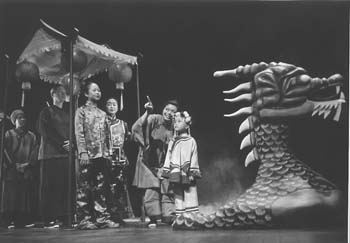![[Metroactive Stage]](/stage/gifs/stage468.gif)
[ Stage Index | Metro | Metroactive Central | Archives ]
Mother Memories
 Children of Joy: Young Ying-ying (Sophie Tamiko Oda) takes in a parade. Recollections connect the generations in 'The Joy Luck Club' By Heather Zimmerman THE INTRICATE chemistry of the relationship between mother and daughter has been grist for many a book, from fiction to self-help, but few explore it so eloquently as Amy Tan's novel The Joy Luck Club. Playwright Susan Kim adapted for the stage Tan's book about four Chinese women, Suyuan Woo, Lindo Jong, An-mei Hsu and Ying-ying St. Clair, and their daughters raised in the U.S.: Jing-mei (June), Waverly, Rose and Lena, respectively. TheatreWorks gives the play its West Coast premiere in a well-acted and thoughtful production. After leaving China in the 1940s to build new lives in San Francisco, Suyuan, Lindo, An-mei and Ying-ying deal with culture shock not only on a general level but also within their own families. The Joy Luck Club recounts the elder women's past struggles in China as well as their daughters' difficulties--both as children and as adults--in reconciling Western notions with their Chinese heritage. Director Margaret Booker sensitively helms an excellent cast, keeping the balance in a precarious pace that allows each of the eight principal characters to be individually explored, but never to the point that the production lags. The play begins shortly after Suyuan dies, and the adult Jing-mei (Julie Oda) finds herself expected to take her mother's place in the Joy Luck Club, a monthly gathering at which her mother, Lindo, An-mei and Ying-ying would play mah jong, gossip and commiserate. Among these longtime family friends, Jing-mei begins to discover things about her mother, whom she felt she never really knew. She remembers a botched piano recital and reflects on how she always felt she could never live up to her mother's high expectations. Jing-mei's memories pave the way for the stories of the other three daughters and their mothers, whose pasts are also revealed in flashbacks, along with events from the present day. Among these stories: the flamboyant Lindo (Lisa Lu) tells of her clever escape from an arranged marriage; her daughter, Waverly (Bonnie Akimoto), remembers how her stint as a child chess prodigy came to an end when she fought with her mother. An-mei (Dewi Yee) recalls as a small child her confusion over her mother's being disowned by her family. In a flashback, we learn that Suyuan (Takayo Fischer) was forced to abandon her twin baby daughters while fleeing a city under siege by the Japanese. Many of the stories have a tragic side, but most do result in a triumph of sorts. An-mei tells Rose (Kerry Susan Lee) of her grandmother's fate to help her learn to stand up to her bossy soon-to-be ex-husband. Similarly, Ying-ying (June Kyoko Lu) urges Lena (Lisa Takata) to come to terms with her unhappy marriage. Although much of the dialogue is verbatim from Tan's novel, Kim's adaptation loses some dramatic momentum by not following an important aspect of the book's structure. The novel is loosely arranged, like a series of interlocking short stories, but Suyuan's story of her lost children provides a frame for all the others, setting up the novel's theme of the Westernized daughters learning to understand their Chinese mothers. Near the beginning of the novel, Jing-mei discovers at her first meeting of the Joy Luck Club not only that Suyuan had been searching for her lost twin daughters, but that they have been found. Suyuan's friends tell Jing-mei that she must go to China to meet her sisters. Kim withholds this event until the second act, with the effect that it's not a haunting, over arching story, as in Tan's book, that informs the overall theme of revelation, but more like another secret Jing-Mei didn't know her mother had. However, viewed individually, the women's stories are no less affecting, and the cast turns in some brilliant, sometimes wrenching, performances. J.B. Wilson's sets are sparse but visually appealing, complementing Fumiko Bielefeldt's costumes, which are color-coded for each family in a way that lends a subtle sense of belonging to each mother-daughter pair. In The Joy Luck Club, the characters are primary, and this elegant production allows them to shine through. The Joy Luck Club plays this week Thursday-Saturday at 8pm, Sunday at 2 and 7pm, Tuesday at 7:30pm, and Wednesday at 8pm at the Center for the Performing Arts, Castro and Mercy streets, Mountain View. The play runs through May 2. Tickets are $25-$33. (650/903-6000) [ San Jose | Metroactive Central | Archives ]
|
From the April 22-28, 1999 issue of Metro.
Copyright © Metro Publishing Inc. Maintained by Boulevards New Media.